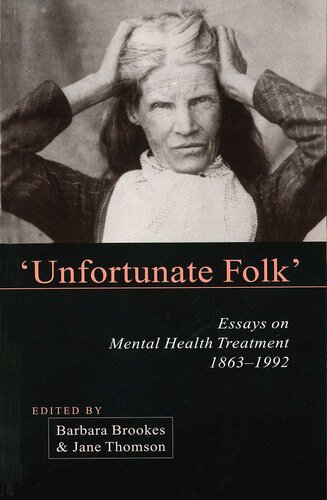

Most ebook files are in PDF format, so you can easily read them using various software such as Foxit Reader or directly on the Google Chrome browser.
Some ebook files are released by publishers in other formats such as .awz, .mobi, .epub, .fb2, etc. You may need to install specific software to read these formats on mobile/PC, such as Calibre.
Please read the tutorial at this link: https://ebookbell.com/faq
We offer FREE conversion to the popular formats you request; however, this may take some time. Therefore, right after payment, please email us, and we will try to provide the service as quickly as possible.
For some exceptional file formats or broken links (if any), please refrain from opening any disputes. Instead, email us first, and we will try to assist within a maximum of 6 hours.
EbookBell Team

5.0
78 reviewsFrom electro-convulsive therapy to epilepsy, from criminal lunacy to community care, 'Unfortunate Folk': Essays on Mental Health Treatment, 1863-1992, opens windows on to the history of mental health treatment in New Zealand. It is one of the few books available on the history of mental health in New Zealand.
Each contributor has shed light on a specific area, and in the process important information about institutions, patients and caregivers, and methods of treatment is unearthed. The siting of Seacliff Hospital at a distance from Dunedin, for example, was less about keeping patients away from the public, and more about the treatment regimes favoured at the time: fresh air, outdoor exercise and work on the farm. Some personalities, such as Truby King of Plunket fame, are seen employed in another aspect of their life's work.
The first two sections of the book provide a regional focus, charting changes in treatment and care in the Otago region since the founding of the Dunedin Lunatic Asylum 1863. The authors trace the development of individual institutions over the years, and show how a national policy or the lack of it is played out locally. They discuss staffing and medical training, public and private hospitals, and the modern development of community care.
Jane Adams has contributed a chapter on criminal lunacy, which is part of a longer essay that won her the prize for best essay in the Australia and New Zealand Law and History competition. She shows that the danger presented by those judged to be criminally insane was, in fact, negligible.
The final section of 'Unfortunate Folk' looks at some wider New Zealand patterns, with the creation of a specialty within medicine directed specifically towards mental health treatment. One chapter uses an oral history approach to explore why psychiatry practice particularly appeals to women.